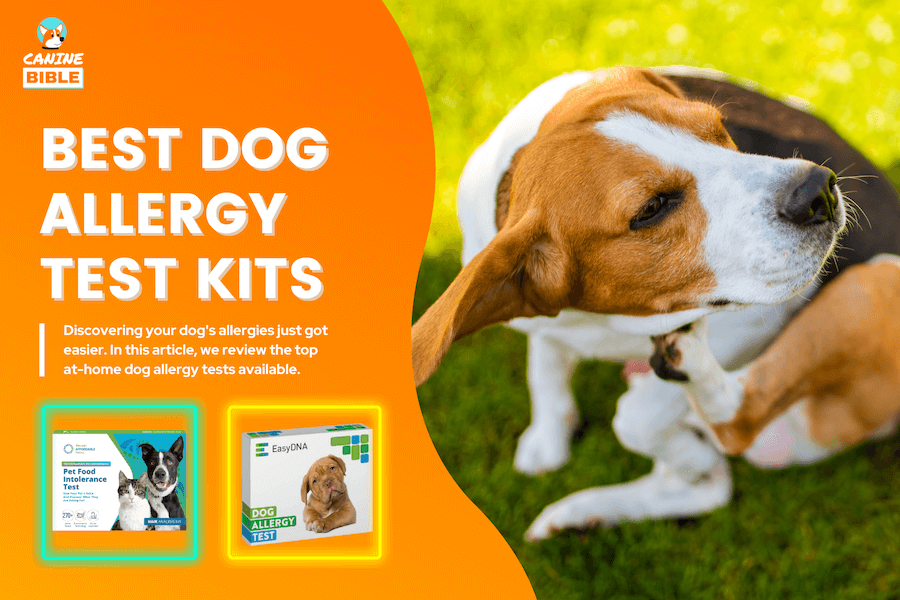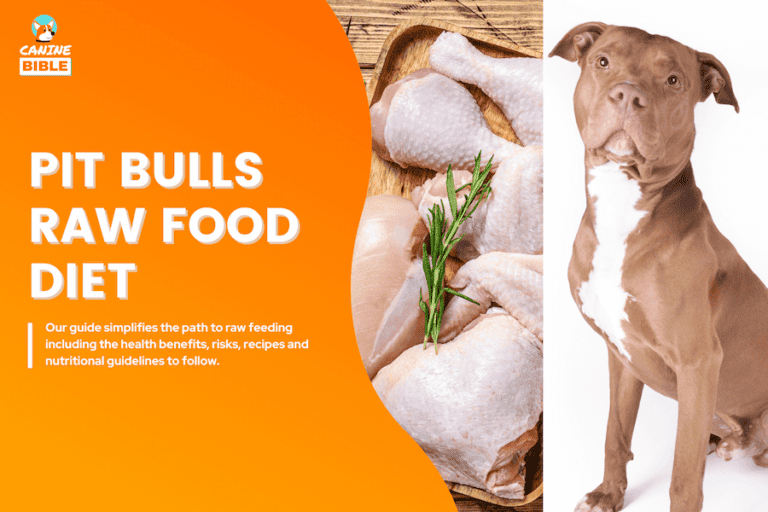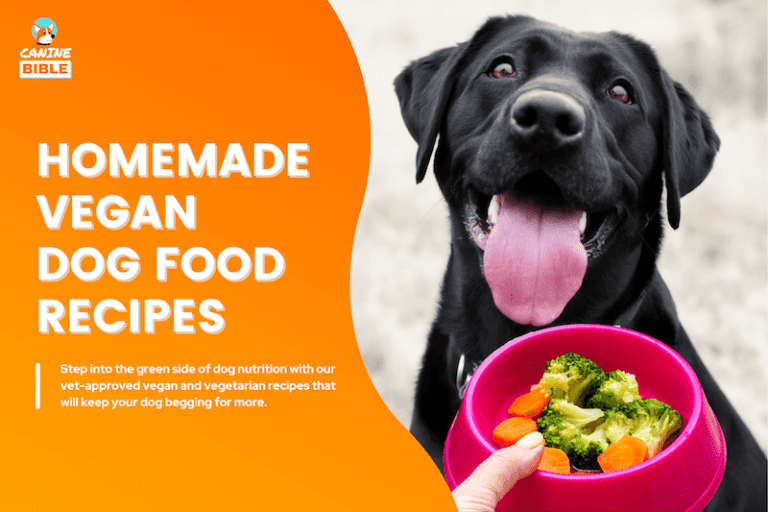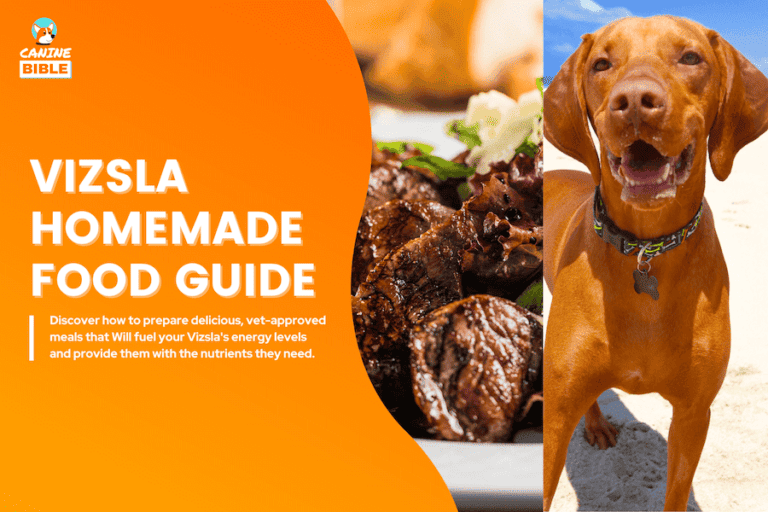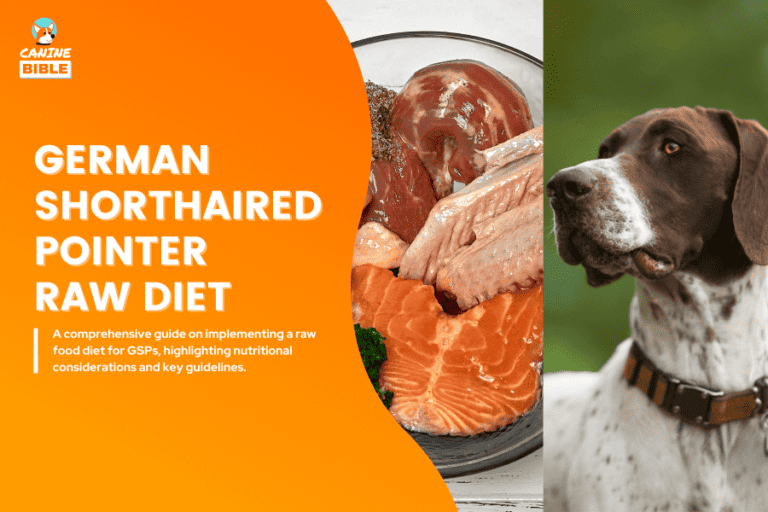Can Dogs Eat Wasabi? Is Wasabi Bad For Dogs? Vets Answer
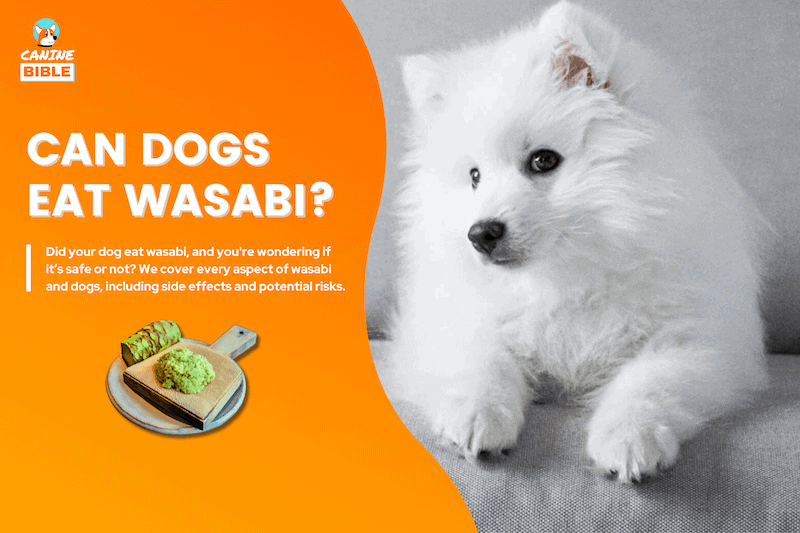
Canine Bible is reader-supported. We receive affiliate commissions via some of our links. This doesn’t affect rankings. Learn more.
Wasabi, a plant native to Japan, is widely known for its strong, pungent flavor, often associated with sushi and other Japanese dishes. While it’s a staple in many kitchens and restaurants, the question of its safety for dogs is less straightforward.
Commonly, wasabi is found in a paste or powder form, and its intense taste is something most humans experience with caution. But can dogs eat wasabi? Will wasabi hurt dogs? While a small amount of wasabi is unlikely to cause serious harm, it is not suitable for dogs. Feeding wasabi to your dog may cause gastrointestinal issues and irritation to their mouth and snout.
What if my dog accidentally ate wasabi? What should I do? This article covers everything about this topic.
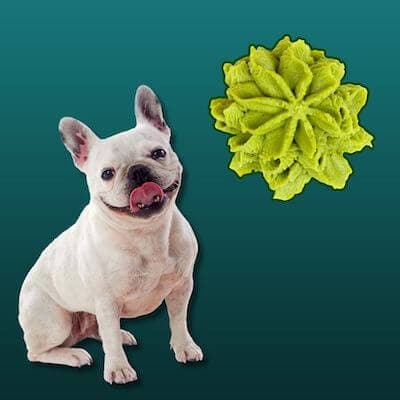
Is Wasabi Good For Dogs?
When considering whether wasabi is good for dogs, the answer is no. While wasabi may have certain human health benefits, such as antibacterial, anti-cancer, and anti-inflammatory properties, these do not necessarily translate to canine health.
The wasabi plant, a member of the Brassicaceae family, which includes cabbage, horseradish, and mustard, is not necessarily good for dogs. Wasabi is known for its intense heat and spiciness, which can be too harsh for a dog’s digestive system. Overconsumption of wasabi by your dog could lead to discomfort, including burning sensations in the mouth, sinus irritation, vomiting, gas, or even diarrhea. Dogs do not tolerate spicy foods like wasabi and should not be fed to them.
Wasabi Components Toxicity Analysis In Dogs
Is Wasabi Toxic to Dogs?
Wasabi is not inherently toxic for dogs. You should never give wasabi to your dog under any circumstance. As we saw above, wasabi contains two toxic ingredients and three potentially dangerous compounds to dogs. For example, the key component of wasabi, Allyl isothiocyanate, is toxic for dogs. Allyl isothiocyanate is responsible for burning, and the pungent taste of wasabi is toxic to dogs.
Wasabi’s pungent taste is a natural defense mechanism for the wasabi plant against herbivores like horses, deer, and cows. The spicy nature of the wasabi plant makes it unappealing to these plant-eating animals.
Allyl isothiocyanate (wasabi) should be avoided in a dog’s diet. If larger animals such as horses and cows are deterred from eating wasabi due to its effects, it’s sensible to apply the same caution for our smaller canine companions. Even in humans, wasabi’s spiciness can make adults tear up and cause other problems when eaten in excess.
Can Dogs Have Wasabi?
Wasabi as a whole is not recommended for canine consumption. Its strong flavor and potential irritants can cause gastrointestinal upset and oral irritation. The strong taste can cause a strong reaction in a dog’s nasal passages and respiratory system. It’s always best to stick to dog-safe foods and treats and avoid feeding human foods like wasabi to pets.
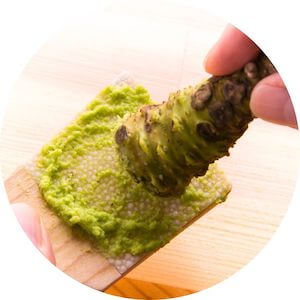
5 out of 6 components in wasabi
are not safe for dogs
Can Dogs Eat Wasabi Peas?
Peas can be a good source of fiber, iron, and vitamins A, K, and B for your dog. However, when it comes to wasabi peas, the answer is different. While regular peas are generally safe in moderation, they are not recommended for dogs with kidney issues and can cause digestive problems if consumed in large quantities. Wasabi peas, a popular crunchy snack, are made from dehydrated and roasted peas coated with wasabi. They also contain starch, sugar, salt, and oil. While a single wasabi pea is unlikely to harm your dog, considering the effects of wasabi on dogs, it’s best to err on the side of caution. Given this information, avoiding giving wasabi peas to your dog is advisable.
Beware of Fake Wasabi
According to The Washington Post, approximately 99% of all wasabi sold in the United States is not authentic. The American Chemical Society notes that most of what is marketed as wasabi is a combination of horseradish, hot mustard, citric acid, and green dye. Considering that this imitation wasabi is made from these ingredients, keeping it away from dogs is strongly recommended. Citric acid, in particular, can be harmful to dogs, potentially leading to depression of the central nervous system. Additionally, horseradish, a primary component in fake wasabi, can irritate dogs.
Is Wasabi Bad For Dogs?
While short-term exposure to small amounts of wasabi is unlikely to cause lasting harm, repeated or large doses could lead to more severe health issues, particularly concerning the digestive system. A dog that consumed wasabi may exhibit behavioral changes due to discomfort or pain.
Body Language Signs Your Dog Ate Wasabi
These are some signs dogs may display after eating wasabi.
Possible Side Effects & Risks of Wasabi In Dogs
The following symptoms may indicate a bad reaction to wasabi.
Dog Ate Wasabi: What Should I Do?
One or two bites of wasabi shouldn’t be too much cause for concern. However, you should immediately remove any leftover wasabi from your dog’s mouth, rinse his mouth thoroughly, and provide plenty of water. It’s crucial to prevent your dog from eating wasabi at all.
However, if your dog has consumed a large amount of wasabi or is showing concerning symptoms in reaction to it, contact your veterinarian immediately.
Can’t reach your vet? Contact the Pet Poison Helpline at 1-855-764-7661 or chat live with a veterinary professional via our online vet chat or video chat support (24 hours a day, 7 days a week).
Are Dogs Allergic to Wasabi?
While not common, some dogs may have an allergic reaction to wasabi. Symptoms of an allergic reaction can include itching, swelling, hives, and, in severe cases, anaphylaxis, which is a medical emergency.
If you suspect your dog is having an allergic reaction to any food, including wasabi, it is crucial to consult a veterinarian. Your vet can provide appropriate advice and help you formulate a safe diet plan for your dog. We also recommend conducting an at-home dog allergy test to determine if your dog is sensitive or intolerant to certain foods.
Can Puppies Eat Wasabi?
No, puppies should not eat wasabi. Puppies have more sensitive digestive systems than adult dogs, making them more susceptible to the side effects of wasabi, potentially leading to more severe reactions than adult dogs.
Always prioritize feeding puppies a well-balanced diet suitable for their age, size, and breed. This should predominantly consist of high-quality puppy food and treats specifically formulated to support their growth and development. Introducing human foods, especially spicy or highly seasoned like wasabi, should be avoided to ensure their health and well-being.
Safer Alternatives to Wasabi for Dogs
When it comes to treating your furry friend, numerous dog-friendly options are both safe and nutritious. Here’s a list of alternatives to wasabi and some tips for safe snacking habits:
Frequently Asked Questions
Can Dogs Eat Wasabi? — The Bottom Line
Although wasabi is unlikely to be life-threatening to dogs, a responsible and caring dog parent should never jeopardize their pet’s health. Treat your pup like any other family member, and avoid giving them foods not intended for canine consumption. Understanding potential risks and removing foods that could cause harm is vital to responsible pet ownership. Always opt for dog-safe foods and snacks; when in doubt, seek professional advice from your vet. Lastly, keeping wasabi and other harmful foods out of reach is crucial. This involves secure storage, immediate clean-up after use, and educating household members about the dangers of certain foods to dogs.
If you are concerned about your dog’s digestive health after eating a problematic food, especially if they experience side effects, a dog gut health test can provide valuable insights into your dog’s gastrointestinal condition, which plays a crucial role in overall health.
Like It? Subscribe & Share!
Sources
Canine Bible uses only high-quality sources, including peer-reviewed studies, to support the facts within our articles. Read our editorial process and product review methodology to learn more about how we fact-check, test products, and keep our content accurate, reliable, and trustworthy.
Canine Bible authorship represents the unified voice of our entire editorial team and our in-house veterinarians rather than a single author. Each article, blog post, and review published under the Canine Bible name undergoes a rigorous review process, involving all team members to guarantee accuracy and up-to-date in accordance with the latest veterinarian research. This collaborative effort is an integral part of our editorial process and aligns with our four pillars of content creation. This approach ensures our content is backed by expert knowledge and factual information, offering our readers reliable, actionable, and trustworthy content.

